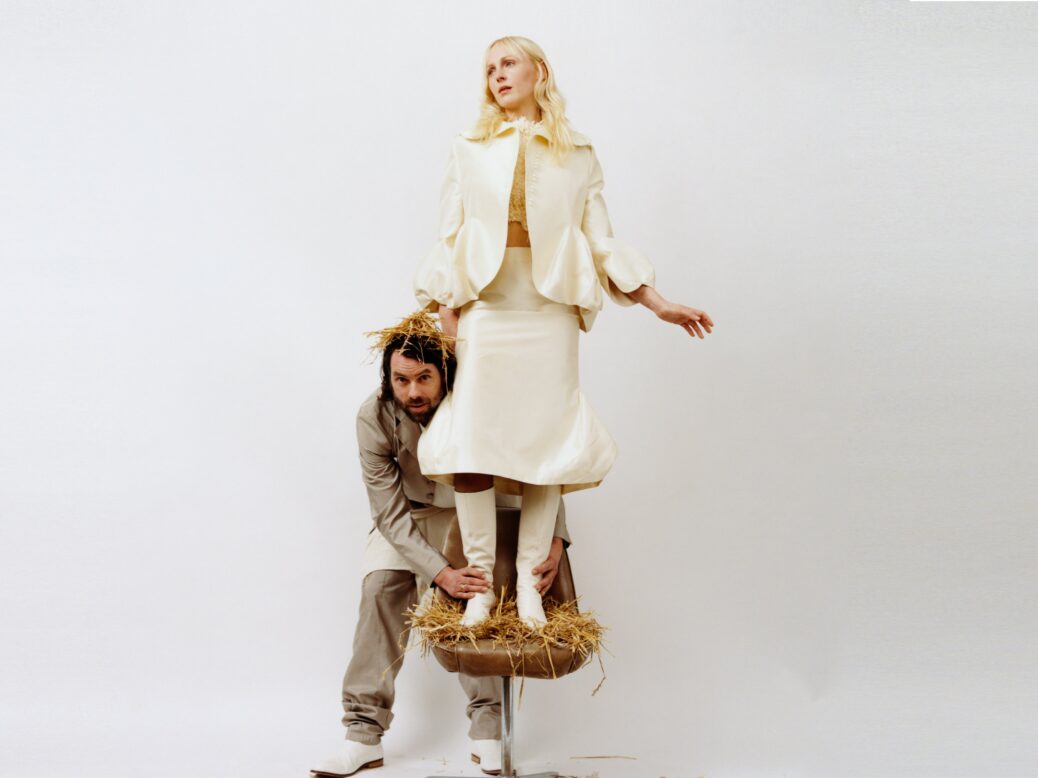
One of the biggest musical surprises of 2018 came when Laura Marling, known for her thoughtful, folk-inspired songwriting, forged a project based around dissonant, electronic drones and fronted by a faceless yeti-like creature. Lump, the eponymous first album by Marling and Mike Lindsay (of the English folk band Tunng), introduced an unlikely but endlessly intriguing pairing. The result was a novel blend of art-pop and ambient electronica that was captivating but occasionally felt awkwardly put together. On Animal, the pair’s second record (released on Chrysalis/Partisan Records on 30 July), Marling and Lindsay maintain the off-kilter weirdness of their first collaboration, but this time it feels instinctive – and exhilarating.
The creative process for Animal replicated that of Lump: Lindsay wrote the music and Marling, without having heard any of it, arrived in the studio to write the lyrics, reacting almost off the cuff to his sonic textures. He wouldn’t ever ask “why”, or “what does that mean?”. On Lump, this method sometimes resulted in clunkiness. Second time round, each separate part is sure of itself, even if that makes each feel further away from the other; together they sound, if not smoother or more comfortable, truer.
The result of this sparse, spontaneous method of working is a set of songs that are intuitive and tactile. “Finding it hard to believe in/Finding something hard to believe,” sings Marling on “Climb Every Wall”, using the words almost as placeholders in order to feel out the rhythmic dexterity of Lindsay’s chime-like drums and funked-up bass, and in doing so, gently reconfiguring her own lyrical intent. By “collaborating” in such set roles, Marling and Lindsay end up slightly sonically detached, the vocals and instrumentals set apart enough to create a tension that becomes a driving force of their music.
Such push and pull is audible on “Red Snakes”, a slow, eerily beautiful track that features flutes by Laura J Martin and, in Marling’s lyrics, tropes of psychoanalysis – a subject the musician has recently studied for a master’s degree – including a character who stands in “a pool full of red snakes/Up to your knees in a night lake”. These lyrics are vaguer yet more evocative than the stories she typically tells on her solo records. They feel less overwrought and laboured; freer, if not quite stream-of-consciousness. Over Lindsay’s glistening electronics, Marling’s vocals are lullaby-like with their easy rhymes, yet – just as psychoanalytic ideas of the subconscious suggest – an uneasy murkiness lingers under the surface.
[see also: Willow’s Lately I Feel Everything proves emo isn’t dead]
On Animal Lindsay’s melodic tendencies lean closer to electropop than we’ve heard before from Lump – or indeed from Tunng. On the title track, a disco beat pulses and Marling sings: “Dance, dance/This is your last chance/To break a glass heart/Just like you wanted.” His melody is laid back though bright, and animated further by the stark contrast to her vocal tone, which is disconnected, bleary-eyed. Together they form a dance track that is vividly hallucinogenic – an upbeat song with an element of disconnect. Halfway through, the whole song falls apart, we hear percussive crashes and Marling’s choral syllables – and then they fall straight back to the beat.
The album’s heights are “Paradise” and “We Cannot Resist”. As twisted calls to arms, they both cleverly loop Marling’s voice to create kaleidoscopic rings of backing vocals around her main melody. On “Paradise”, rising harmonies end at a euphoric high – a common technique that, when used by Lump (who are usually so disinterested in the obvious), feels like being let in on a great secret. On “We Cannot Resist”, the vocal treatment is far more bizarre – and wonderfully so. Marling’s vocal line is echoed by an electronic guiro effect, a gnarly, toad-like sound that peters out in time for the poppier chorus, though Marling leans towards a description of Lindsay’s grotesque creation in her lyrics: “My object of choice is the oil that forms/On a well strung voice,” she sings, brilliantly confident in her near-nonsense.
Central to the Lump project is the idea of product – of making something to be consumed. As on their first record, the pair include the album credits as part of the audio: Marling reads out “Lump is the product of Mike Lindsay and Laura Marling”, and then lists who played which instruments, who wrote what, and the names of their engineer, mixer and masterer. She may be speaking over psychedelic electronics, but it is a masterfully plain yet thought-provoking way of attributing work to deserving individuals, particularly when, in the age of streaming, liner notes are not so readily available. In reading out their credits, Lump pull up the curtain on their uncanny, quietly revolutionary album, and say: maybe being weird is much more ordinary than you’d think.



